Related Research Articles

The World Cotton Centennial was a World's Fair held in New Orleans, Louisiana, United States in 1884. At a time when nearly one third of all cotton produced in the United States was handled in New Orleans and the city was home to the New Orleans Cotton Exchange, the idea for the fair was first advanced by the Cotton Planters Association. The name "World Cotton Centennial" referred to the earliest-surviving record of export of a shipment of cotton from the U.S. to England in 1784.
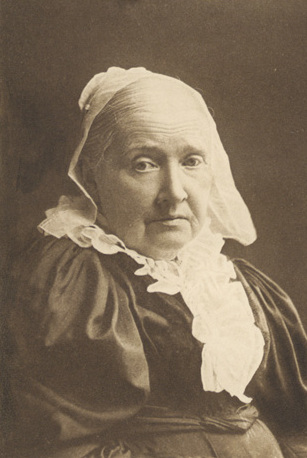
Julia Ward Howe was an American author and poet, known for writing the "Battle Hymn of the Republic" and the original 1870 pacifist Mother's Day Proclamation. She was also an advocate for abolitionism and a social activist, particularly for women's suffrage.

Mary Church Terrell was one of the first African-American women to earn a college degree, and became known as a national activist for civil rights and suffrage. She taught in the Latin Department at the M Street School —the first African American public high school in the nation—in Washington, DC. In 1895, she was the first African-American woman in the United States to be appointed to the school board of a major city, serving in the District of Columbia until 1906. Terrell was a charter member of the National Association for the Advancement of Colored People (1909) and the Colored Women's League of Washington (1892). She helped found the National Association of Colored Women (1896) and served as its first national president, and she was a founding member of the National Association of College Women (1923).
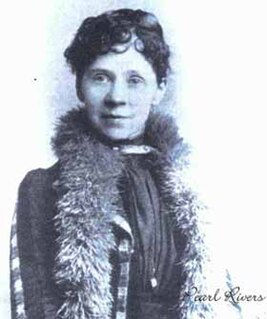
Pearl Rivers was an American journalist and poet, and the first female editor of a major American newspaper. After having been the literary editor of the New Orleans Times Picayune, became the owner and publisher 1876 when her elderly husband died. In 1880 she took over as managing editor, where she continued until her death in 1896.
The Boston Women's Heritage Trail is a series of walking tours in Boston, Massachusetts, leading past sites important to Boston women's history. The tours wind through several neighborhoods, including the Back Bay and Beacon Hill, commemorating women such as Abigail Adams, Amelia Earhart, and Phillis Wheatley. The guidebook includes seven walks and introduces more than 200 Boston women.
Benjamin Clarke Cutler was a Boston merchant, who also served as the sheriff of Norfolk County, Massachusetts from 1798 to 1810.
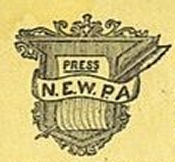
The New England Woman's Press Association (NEWPA) was founded by six Boston newspaper women in 1885 and incorporated in 1890. By the turn of the century it had over 150 members. NEWPA sought not only to bring female colleagues together and further their careers in a male-dominated field, but to use the power of the press for the good of society. The group raised funds for charity and supported women's suffrage and other political causes.
The Woman's Press Club of New York City (WPCNYC) was an American professional association for women journalists and authors. Located at 126 East 23rd Street, in Manhattan, the organization was founded by Jane Cunningham Croly in Manhattan in November 1889, incorporated in 1919, and dissolved on 8 March 1980.

Woman's Foreign Missionary Society of the Methodist Episcopal Church was one of three Methodist organizations in the United States focused on women's foreign missionary services, the others being the WFMS of the Free Methodist Church of North America and the WFMS of the Methodist Protestant Church.
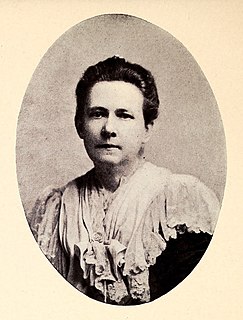
Florence Marion Howe Hall was an American writer, critic, and lecturer about women's suffrage in the United States. Along with her two sisters, Laura Elizabeth Richards and Maude Howe Elliott, Hall received the first Pulitzer Prize for a biography, Julia Ward Howe.
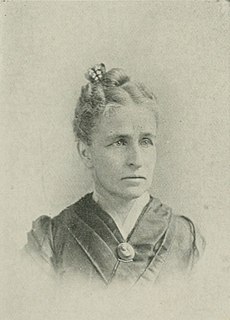
Frances Augusta Conant was an American journalist, editor, and businesswoman. She was the founder and principal promoter of the Illinois Woman's Press Association (IWPA). Conant died in 1903.

Marion A. McBride, also spelled MacBride, was an American journalist and clubwoman. She founded several women's press associations, most notably the New England Woman's Press Association. She wrote and lectured on domestic science, and was active in charitable causes and local politics. It was largely due to McBride's activism that the state of Massachusetts began hiring matrons for city police stations and built a separate facility for female inmates in Boston.

Julia Rush Cutler Ward was an American occasional poet. One of her poems is preserved in Rufus Wilmot Griswold's Female Poets of America (1878).

Mary Osburn Adkinson was an American social reformer active in the temperance movement. She took a leading part in the organization of the Woman's Foreign Missionary Society of the Methodist Episcopal Church in Madison, Wisconsin, serving four times as its elected president. In Louisiana, she held the position of superintendent of the Woman's Christian Temperance Union (WCTU) and matron in the New Orleans University.
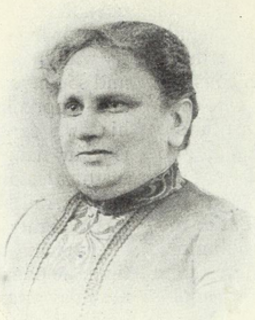
Mary Isabel Greeley was an American educator. From 1887 to 1899 she was first matron at the Perkins School for the Blind's kindergarten program, based in Boston's Jamaica Plain neighborhood, and later a founder and president of the Boston Nursery for Blind Babies.
References
- 1 2 3 Conant, Frances A. (December 1885). "National Press Association". The New Era. 1 (12): 376.

- ↑ "Our History". Illinois Women's Press Association.
- ↑ "Mrs Marion A. McBride Dead: Noted Woman Passes Away at Arlington. Three Press Associations the Result of Her Efforts". The Boston Globe. September 18, 1909.
- ↑ Howe, Julia Ward; Graves, Mary Hannah (1904). Representative Women of New England. New England Historical Publishing Company. p. 425.